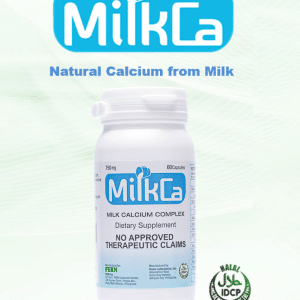Did you know that milk is an excellent source of Calcium? Did you know that our bodies can’t store excess amounts of calcium? It requires a continuous supply to maintain bone density and prevent osteoporosis. But, the benefits of drinking milk and consuming its products go beyond preventing weak bones through the adult years. We are going to explore the benefits of drinking milk regularly, how much is safe for you, what are the alternatives to cow’s milk as well as some great tips on how to incorporate it into your diet if you don’t like it! So keep reading!
Calcium and its Importance in Our Body
Calcium is an essential mineral that our bodies need to function properly. We need it for strong bones and teeth, as well as for proper blood clotting, nerve function, and muscle contraction. It is recommended that women aged 19-50 years consume 1,000 milligrams of calcium per day, while men aged 19-64 years should get 1,200 milligrams per day. In addition to its effects on bone health, calcium may play a role in metabolism and blood pressure, as well as the prevention of colorectal cancer.
The Benefits of Drinking Milk
- Bone Health – One of the most well-known benefits of drinking milk is that it is an excellent source of calcium, which our bodies need to build and maintain strong bones. If you don’t get enough calcium from your diet, you’re at risk for developing osteoporosis, which is a condition that causes bones to become brittle and break easily.
- Weight Management – Studies have shown that the consumption of dairy products is associated with lower rates of obesity. One theory is that calcium, which is abundant in milk, can help regulate metabolism and increase fat oxidation.
- Cardiovascular Health – The same calcium that helps build strong bones also plays an important role in cardiovascular health. Not only does calcium strengthen your bones, but it also helps lower blood pressure, which can reduce the risk of developing cardiovascular disease.
- Improved Digestion – Calcium works together with digestive enzymes to facilitate the breakdown of food in the gastrointestinal tract.
- Mood Regulation – Getting enough calcium can help prevent low levels of serotonin, a neurotransmitter that regulates mood.
The benefits of consuming dairy products
Although we have mentioned the benefits of drinking milk, consuming dairy products is equally beneficial for our bodies. These include: – Bone Health – As mentioned above, dairy products contain significant amounts of calcium, which is essential for building and maintaining strong bones. – Weight Management – Not only does calcium help prevent weight gain, but it also helps with weight loss. Consuming calcium-rich foods can help increase feelings of fullness, making you less likely to overeat. – Cardiovascular Health – Dairy products are a rich source of vitamin D, which is essential for cardiovascular health. Vitamin D deficiency is linked to an increased risk of high blood pressure, heart attack, and stroke. – Improved Digestion – Dairy products contain high levels of digestive enzymes that can help improve digestion and reduce symptoms of irritable bowel syndrome. – Mood Regulation – As with calcium, consuming dairy products can help boost serotonin levels and improve mood.
How much milk should you drink daily?
As we have mentioned above, the daily recommended dose of calcium is 1000-1200 milligrams per day. Depending on your gender and age, you should be consuming the right amount of calcium. The daily recommended amount of calcium is 1300 milligrams per day for women over 51 and men over 70. But what if you’re not a big milk drinker? The good news is that there are plenty of other ways to boost your calcium intake. You can also choose from a wide variety of foods that are rich in calcium, like broccoli, almonds, beans, figs, and sesame seeds.
Alternatives to Cow’s Milk
If you are not a fan of milk and milk products, or if you have certain dietary restrictions, you can opt for some of the following. – Soy milk – This is an excellent source of plant protein and has a similar nutritional profile to cows milk. – Hemp milk – This milk is rich in iron, fiber, and omega-3 fatty acids. It also has a low amount of naturally occurring sugars, making it suitable for those who have diabetes. – Almond milk – This milk is low in calories and fat, and is also suitable for people with nut allergies. – Coconut milk – This is a great choice for vegans and people who are lactose intolerant, as it is free of animal products. – Flaxseed milk – This milk is high in fiber and omega-3 fatty acids, and can be used as a substitute for regular milk in various recipes and drinks. – Fig milk – This milk is low in calories, fat-free, and high in iron.
-
Sleepeezy Valerian Root Extract 150mg: Your Natural Sleep Aid₱799.00
-
Fern-E₱1,700.00
-
i-Fern Trio Pack 120₱3,000.00
-
FERN Flex 30 capsules₱1,800.00
-
Healthy Fern Coffee 10s₱500.00
-
i-Fern Trio Pack 60₱2,300.00
-
Improve Bone Health with MilkCa₱1,100.00
-
Fern-D great for Immunity₱700.00 – ₱1,300.00
-
FERN-ACTIV₱950.00
Bottom line
As you can see, drinking milk is not only good for your bones, it is also good for your overall health. Not only does it provide you with important nutrients, but it also helps lower your risk of developing heart disease, osteoporosis, and many other diseases and conditions. The good news is that there are many different ways to consume milk, even if you don’t like it in liquid form! For more health tips, sign up for our newsletter, or follow us on social media!









